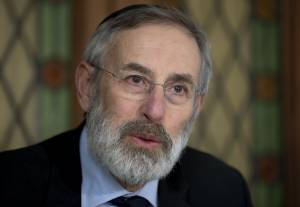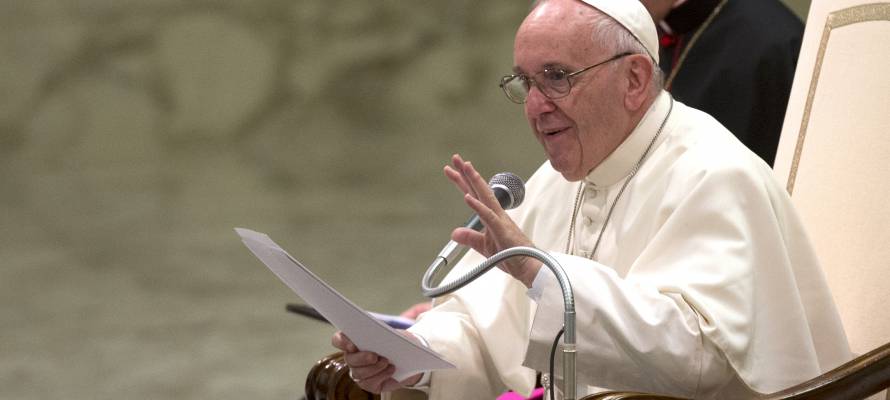The chief rabbi of Rome, Riccardo Di Segni, said that the papal visit is aimed at showing five decades of improving Christian-Jewish relations and interfaith harmony, at a time of Islamic extremist violence around the globe. But he also said some recent Vatican developments “cannot be so appreciated by the Jewish community.”
Pope Francis on Sunday becomes the third pope to visit Rome’s main synagogue in a sign of continued Catholic-Jewish friendship that was highlighted by a recent Vatican declaration that it doesn’t support official efforts to convert the Jews.
But the visit also follows a series of developments that have upset some in the Jewish community, including a new Vatican treaty signed with the “state of Palestine” and Francis’ own words and deeds that have been interpreted by some as favoring the Palestinian political cause.
The chief rabbi of Rome, Riccardo Di Segni, said in an interview Friday that the papal visit is aimed at showing five decades of improving Christian-Jewish relations and interfaith harmony, at a time of Islamic extremist violence around the globe.
But he said some recent Vatican developments “cannot be so appreciated by the Jewish community.”
Earlier this month, a treaty went into effect regulating the life of the Catholic Church in the Palestinian territories. It was the first treaty the Holy See had signed with the “state of Palestine” after the U.N. General Assembly recognized Palestine in 2012.
Before that, in May last year, Francis privately told the visiting Palestinian leader, Mahmoud Abbas, that he was “a bit an angel of peace.” And a year before that Francis began his visit to the region in Bethlehem, not Israel, and stopped his popemobile to pray at the separation barrier Israel had built around the West Bank city.
Given all that, Jews welcomed a document issued by the Vatican last month tracing 50 years of improved relations following the Second Vatican Council’s “Nostra Aetate” declaration which , among other things, repudiated the centuries-old charge that Jews as a whole were responsible for the death of Christ.

Riccardo Di Segni, Rabbi of the Grand Synagogue of Rome. (AP/Michael Sohn)
In the new document, the Vatican went farther than “Nostra Aetate” or any subsequent Vatican statement making clear that Jews are in a salvific relationship with God and that the Catholic Church “neither conducts nor supports any specific institutional mission work directed towards Jews.”
“This document is very significant,” said Rabbi David Rosen of the American Jewish Committee, the Vatican’s longtime dialogue partner with the Jewish community who will attend Sunday’s visit as a representative of the chief rabbinate of Israel.
But Rosen, during the official Vatican launch of the document, pointed out the absence of any reference to Jews’ relationship with the land of Israel, or to the establishment of diplomatic relations between Israel and the Holy See in 1993. That development alone has paved the way for successive papal trips to Israel.
The absence is likely explained by the realpolitik of the Vatican’s diplomacy in the Middle East and the reality of the Catholic Church in the region, where Christians are a minority — and a persecuted minority at that.
Rosen, however, is certain that Francis recognizes the special relationship of world Jewry with Israel. Francis, whose longstanding friendship with the Jewish community in Argentina is well known, reportedly told a recent visiting Jewish delegation that attacks on the state of Israel amount to anti-Semitism.
“I think Pope Francis is even one step ahead of his predecessors in his understanding of the importance of the land of Israel for the Jewish people,” Rosen said in a telephone interview. “That doesn’t mean that within the Curia, even if sympathetic, there aren’t those who still feel that there has to be an official caution that is required by manifold interests.”
Di Segni, the chief rabbi of Rome, told reporters this week that he would underline the crucial link between Jews and Israel in his speech on Sunday. And while welcoming the theoretical declaration that the Catholic Church cannot support institutional efforts at converting Jews, he said he hoped Francis would provide “concrete signs” translating that during his synagogue visit.
Most of all, Di Segni said Sunday’s visit would be an opportunity to show the continuity of Catholic-Jewish friendship at a time when the world is confronting a spate of religiously inspired violence.
“We are living in very difficult times, facing a wave of violence and hatred and destruction of society based and inspired by distorted visions of religion,” he said. “So the aim of this visit should be to demonstrate that different religions — that must be different — can live together in good harmony and work together for the good of the society.”
By: Nicole Winfield, AP
